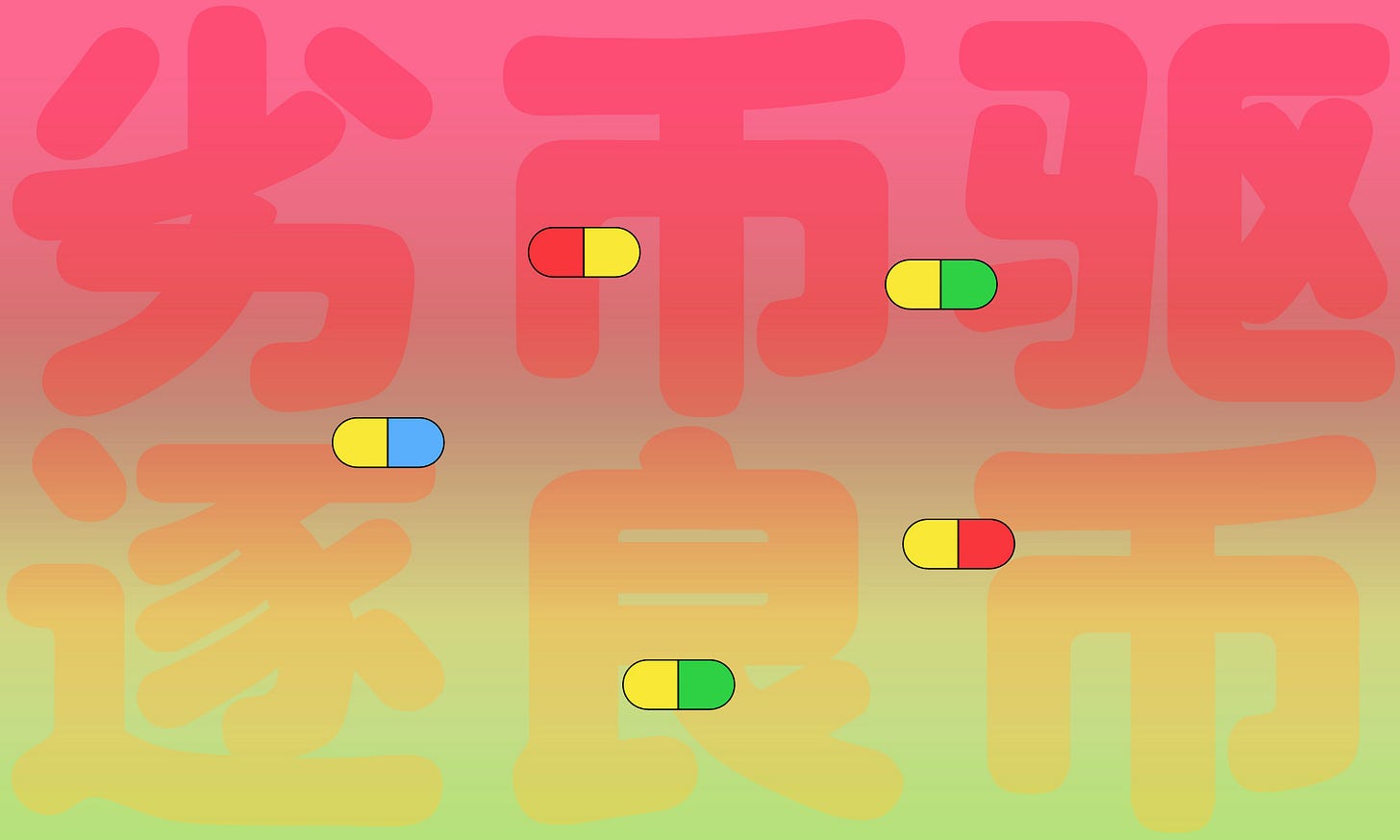"Bad money drives out good" — Phrase of the Week
How a 16th-century economic principle explains China's pharmaceutical woes

Our phrase of the week is: "bad money drives out good" (劣币驱逐良币 liè bì qū zhú liáng bì).
Context
Concerns over the quality of Chinese-made generic drugs (仿制药 fǎng zhì yào) have resurfaced in China.
It began when a delegate of the Shanghai Chinese People's Political Consultative Conference (CPPCC) warned that some drugs procured through China’s centralised procurement system—which negotiates bulk purchases of drugs to lower costs and supply them to patients through the health reimbursement system—are not as effective as their branded equivalents.
He used beautifully idiomatic, but blunt, language to make the point in just 12 characters:
"We have some anesthetics that don’t sedate, blood pressure drugs that don’t lower blood pressure, and laxatives that don’t relieve constipation."
麻药不睡、血压不降、泻药不泻
má yào bú shuì, xuè yā bú jiàng, xiè yào bú xiè
China’s National Medical Products Administration (NMPA) responded, stressing that all generic drugs procured through centralised procurement must pass its “consistency evaluation” (一致性评价 yī zhì xìng píng jià)—a test meant to ensure generic drugs match the safety and efficacy of their branded equivalents.
Days later, a blog post by Dr. Xià Zhìmǐn 夏志敏 reignited the debate. Analyzing NMPA drug evaluation data, he found that among the 1,988 generic drugs approved through consistency evaluations, some had identical (雷同) test results to their branded counterparts—down to the last decimal place, an anomaly that should be nearly impossible.
Dr. Xià suggested that either the testing data had been falsified or serious oversight had occurred.
This latest controversy raises fresh concerns about the reliability of China’s centralised procurement and consistency evaluation systems—and, ultimately, the credibility of some Chinese-made generic drugs.
Confidence in Chinese-made drugs is already low as we saw last year when patients were unable to access branded drugs in hospitals.
This just makes matters even worse according to one industry insider:
"Do not let bad money drive out good!" This should be our loudest call in support of imported original drugs, as well as domestically produced generic drugs made with integrity and of good quality.
“不要让劣币驱逐良币”!应该是我们最大的呼声,不管是进口原研药,还是凭着良心做药的,质量有保障的国产良心仿制药。
“Bú yào ràng liè bì qū zhú liáng bì”!Yīnggāi shì wǒmen zuì dà de hūshēng, bùguǎn shì jìnkǒu yuányán yào, háishì píngzhe liángxīn zuò yào de, zhìliàng yǒu bǎozhàng de guóchǎn liángxīn fángzhì yào.
And with that, we have our Sinica Phrase of the Week!
What it means
“Bad money drives out good” (劣币驱逐良币 liè bì qū zhú liáng bì) is a six-character idiom-like phrase in Chinese.
But it’s actually not Chinese at all! The phrase is a direct translation of the economic principle, Gresham’s Law, from English.
Gresham’s Law—“bad money drives out good”—is named after Sir Thomas Gresham, an English financier who advised Queen Elizabeth I in the 16th century. The law states that when two forms of money circulate at the same legal value, people will spend the money perceived as lower in value (“bad” money) while hoarding or removing from circulation the money with higher intrinsic value (“good” money).
For example, Gresham observed that if coins made of precious metals circulate alongside coins of the same face value but made of cheaper materials, people will prefer to spend the cheaper coins and keep the more valuable ones.
Interestingly, Gresham's Law is one of those foreign economic principles that have been widely adopted in Chinese—perhaps even more so than in its original language.
However, in Chinese usage, the meaning has shifted slightly. In Gresham’s original interpretation, the more valuable currency—or in a modern context, a high-quality product or commodity such as pharmaceuticals—was hoarded. But in the Chinese context, the outcome is different: rather than being hoarded, "bad money"—such as cheaply made, low-quality products—simply replaces higher-quality alternatives altogether, as higher-priced, better-made products are pushed out of the market.
This dynamic is particularly evident in China's pharmaceutical industry, where manufacturers face immense pressure to cut costs and remain competitive under the centralised procurement system.
As a result, companies are often forced into either “involuted competition” (内卷)—a relentless “race to the bottom” on price (卷价格)—or, in some cases, resort to cutting corners by using lower-quality raw materials. Some even pay testing organisations for “guaranteed approval” (包评) of their drugs.
But in the long run, this harms the entire pharmaceutical industry by driving out the “good” companies—those that can no longer afford to compete.
Andrew Methven is the author of RealTime Mandarin, a resource to help you learn contemporary Chinese in context, and stay on top of the latest language trends in China.
Read more about how this story is being discussed in the Chinese media in this week’s RealTime Mandarin.





